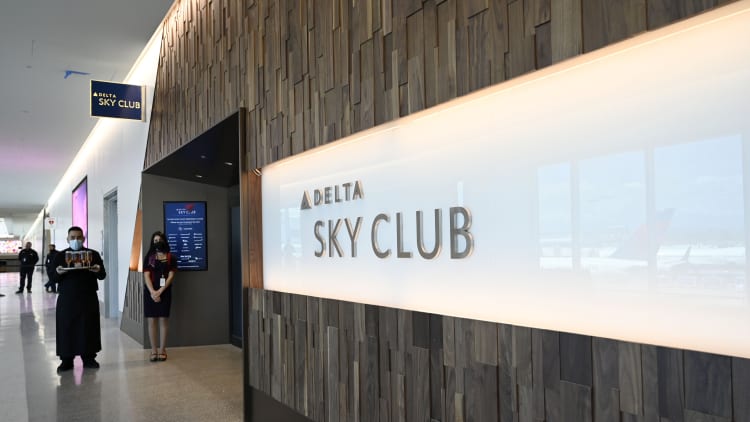
Travelers are flocking to airport lounges in search of complimentary food, drinks and perhaps most importantly, a chance to relax away from the hordes of travelers at the gate. The problem: plenty of other travelers are, too.
Armed with high-end rewards credit cards and fresh from years of big spending, more and more travelers are gaining access to airport lounges, turning what were once small, exclusive spaces for an elite few into a must-have stop for millions of passengers.
The trend has posed both an opportunity and a challenge for airlines and credit card companies as they market luxury to the masses. The spaces have to be both exclusive and attainable for enough people.
For top frequent flyers and certain credit card holders, standard airline lounge access is complimentary or discounted. Individual annual lounge memberships run between $650 and $850 for the major U.S. carriers, which have raised prices in recent years.

Delta’s new Sky Club at New York’s John F. Kennedy International Airport
Benji Stawski / CNBC
Delta Air Lines Sky Club lounges — and the credit cards that grant entry to them — became so popular that customers complained about the long lines and crowds at many locations. The airline in response curbed access for employees, instituted time limits and in its most controversial move yet, announced annual limits on visits for many credit card holders — even stripping some credit cards of access altogether.
But many customers complained about those changes, too, saying they were too strict. This week, Delta walked back some of the changes, highlighting how hard it has become to strike the right balance between exclusivity and access.
“Any wait is too long, and we are doing everything we can to minimize that,” Delta’s chief customer experience officer, Allison Ausband, told CNBC last summer at the opening of a new, larger Sky Club at John F. Kennedy International Airport in New York.
She said the lounges are “not a profit center for Delta by any means” but are an “investment that we’re making in the premium experience for our customers.”
Delta executives have said that revenue growth for its premium products like business class has outpaced that of main cabin economy.
More space
Delta, United Airlines and American Airlines are racing to build more lounges and spaces and larger ones to fit high demand.
They have also divided, or are planning to divide their lounges into different tiers. United, for example, opened a grab-and-go express club at its hub at Denver International Airport last year, for travelers making tight connections, which the carrier said could free up space in more full-service lounges.
The carrier separately operates a network of Polaris lounges for travelers booked in its highest cabin class, usually on long-haul international routes.

United Airlines Polaris lounge at Newark Liberty International Airport.
Leslie Josephs | CNBC
Delta is in the process of building a network of highest-tier lounges aimed at travelers in its Delta One suites and other top customers. Those spaces are slated to begin opening next year, starting with one at Kennedy Airport, followed by Los Angeles and Boston.
Credit card issuers such as JPMorgan Chase, Capital One and American Express are also opening new spaces in airports, eager to attract and retain high-spending customers.
“Customers reward companies that take care of them and that are on their side and and that create amazing experiences,” said Jenn Scheurich, head of travel at Capital One.
The company has opened clubs at Washington Dulles International Airport and Dallas/Fort Worth International Airport and plans to open one at Denver International Airport early next month, with other projects at New York’s LaGuardia Airport and Ronald Reagan Washington National Airport.
Capital One Venture X cardholders pay a $395 annual fee for that card, which comes with unlimited access to the company’s lounges, as well as access for two guests. The general public can get in for $65 a visit.
Chase opened its first Chase Sapphire lounge in Hong Kong in 2022 and its first in the U.S., at Boston Logan International Airport, in May, featuring a tap room and massage chairs. It’s planning to open other lounges at LaGuardia Airport, Washington Dulles, Las Vegas, Philadelphia, Phoenix and San Diego.
Those lounges are open to customers with Chase Sapphire Reserve cards, which have a $550 annual fee, along with two guests.








